The Cambridge History of China. Vol. 13: Republican China 1912-1949, Part 2
Подождите немного. Документ загружается.

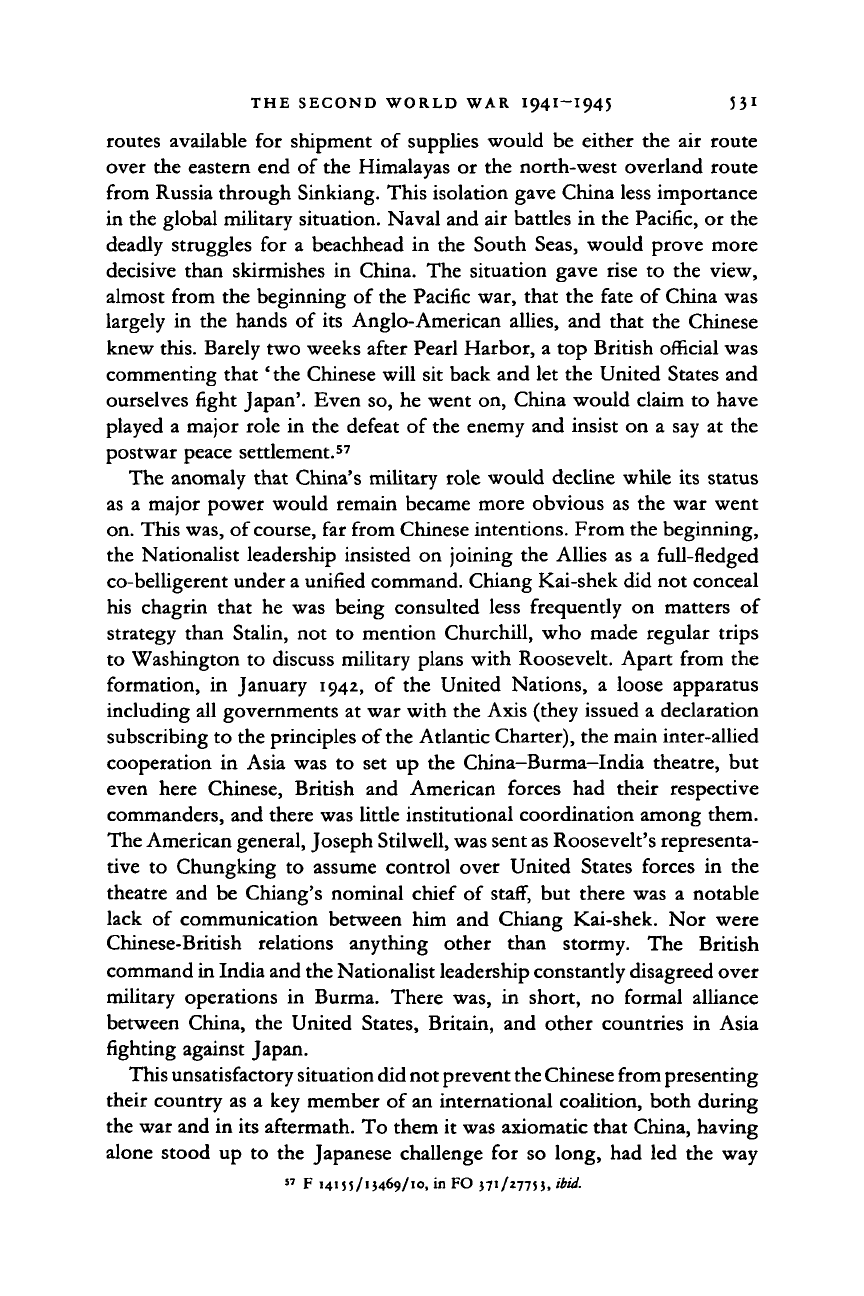
THE SECOND WORLD WAR I94I-I945 531
routes available
for
shipment
of
supplies would
be
either
the air
route
over
the
eastern
end of
the Himalayas
or the
north-west overland route
from Russia through Sinkiang. This isolation gave China less importance
in the global military situation. Naval and
air
battles
in
the Pacific,
or the
deadly struggles
for a
beachhead
in the
South Seas, would prove more
decisive than skirmishes
in
China.
The
situation gave rise
to the
view,
almost from
the
beginning
of
the Pacific war, that
the
fate
of
China
was
largely
in the
hands
of its
Anglo-American allies,
and
that
the
Chinese
knew this. Barely two weeks after Pearl Harbor,
a top
British official was
commenting that'
the
Chinese will
sit
back
and let the
United States
and
ourselves fight Japan'. Even so,
he
went
on,
China would claim
to
have
played
a
major role
in the
defeat
of
the enemy
and
insist
on a say at the
postwar peace settlement.
57
The anomaly that China's military role would decline while
its
status
as
a
major power would remain became more obvious
as the war
went
on. This was,
of
course,
far
from Chinese intentions. From the beginning,
the Nationalist leadership insisted
on
joining
the
Allies
as a
full-fledged
co-belligerent under a unified command. Chiang Kai-shek did not conceal
his chagrin that
he was
being consulted less frequently
on
matters
of
strategy than Stalin,
not to
mention Churchill,
who
made regular trips
to Washington
to
discuss military plans with Roosevelt. Apart from
the
formation,
in
January
1942, of the
United Nations,
a
loose apparatus
including all governments
at
war with the Axis (they issued
a
declaration
subscribing
to
the principles
of
the Atlantic Charter), the main inter-allied
cooperation
in
Asia
was to set up the
China-Burma-India theatre,
but
even here Chinese, British
and
American forces
had
their respective
commanders, and there was little institutional coordination among them.
The American general, Joseph Stilwell, was sent as Roosevelt's representa-
tive
to
Chungking
to
assume control over United States forces
in the
theatre
and be
Chiang's nominal chief
of
staff,
but
there
was a
notable
lack
of
communication between
him and
Chiang Kai-shek.
Nor
were
Chinese-British relations anything other than stormy.
The
British
command in India and the Nationalist leadership constantly disagreed over
military operations
in
Burma. There
was, in
short,
no
formal alliance
between China,
the
United States, Britain,
and
other countries
in
Asia
fighting against Japan.
This unsatisfactory situation did not prevent
the
Chinese from presenting
their country
as a
key member
of
an international coalition, both during
the war and
in
its aftermath.
To
them
it
was axiomatic that China, having
alone stood
up to the
Japanese challenge
for so
long,
had led the way
57
F
14155/15469/10,
in
FO 371/27753,
ibid.
Cambridge Histories Online © Cambridge University Press, 2008
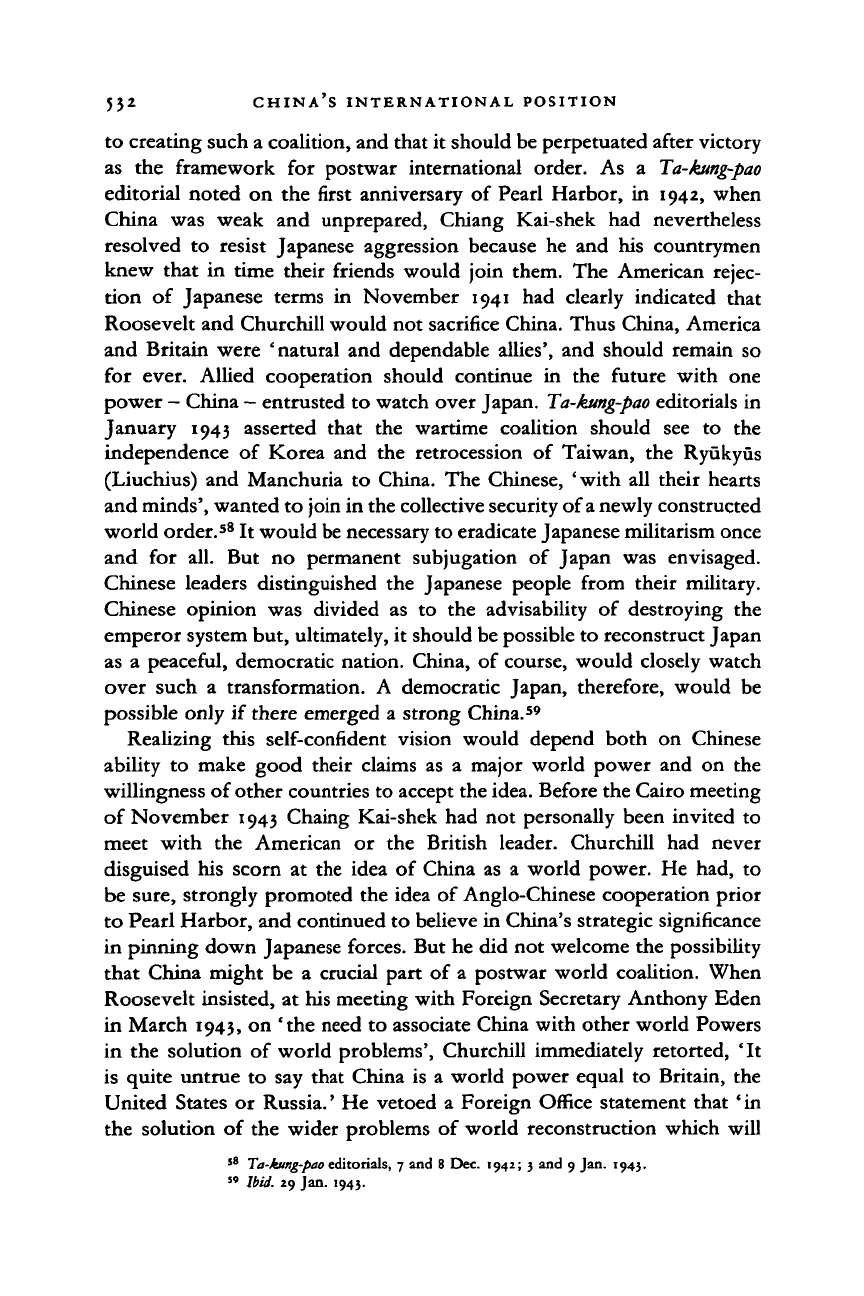
532
CHINA'S
INTERNATIONAL
POSITION
to creating such a coalition, and that it should be perpetuated after victory
as the framework for postwar international order. As a Ta-kung-pao
editorial noted on the first anniversary of Pearl Harbor, in 1942, when
China was weak and unprepared, Chiang Kai-shek had nevertheless
resolved to resist Japanese aggression because he and his countrymen
knew that in time their friends would join them. The American rejec-
tion of Japanese terms in November 1941 had clearly indicated that
Roosevelt and Churchill would not sacrifice China. Thus China, America
and Britain were 'natural and dependable allies', and should remain so
for ever. Allied cooperation should continue in the future with one
power - China - entrusted to watch over Japan.
Ta-kung-pao
editorials in
January 1943 asserted that the wartime coalition should see to the
independence of Korea and the retrocession of Taiwan, the Ryukyiis
(Liuchius) and Manchuria to China. The Chinese, 'with all their hearts
and minds', wanted to join in the collective security of a newly constructed
world order.
s8
It would be necessary to eradicate Japanese militarism once
and for all. But no permanent subjugation of Japan was envisaged.
Chinese leaders distinguished the Japanese people from their military.
Chinese opinion was divided as to the advisability of destroying the
emperor system but, ultimately, it should be possible to reconstruct Japan
as a peaceful, democratic nation. China, of course, would closely watch
over such a transformation. A democratic Japan, therefore, would be
possible only if there emerged a strong China.
s9
Realizing this self-confident vision would depend both on Chinese
ability to make good their claims as a major world power and on the
willingness of other countries to accept the idea. Before the Cairo meeting
of November 1943 Chaing Kai-shek had not personally been invited to
meet with the American or the British leader. Churchill had never
disguised his scorn at the idea of China as a world power. He had, to
be sure, strongly promoted the idea of Anglo-Chinese cooperation prior
to Pearl Harbor, and continued to believe in China's strategic significance
in pinning down Japanese forces. But he did not welcome the possibility
that China might be a crucial part of a postwar world coalition. When
Roosevelt insisted, at his meeting with Foreign Secretary Anthony Eden
in March 1943, on 'the need to associate China with other world Powers
in the solution of world problems', Churchill immediately retorted, ' It
is quite untrue to say that China is a world power equal to Britain, the
United States or Russia.' He vetoed a Foreign Office statement that ' in
the solution of the wider problems of world reconstruction which will
58
Ta-kung-pao editorials,
7
and
8
Dec. 1942;
3
and
9
Jan. 1943.
59
Ibid.
29 Jan. 1943.
Cambridge Histories Online © Cambridge University Press, 2008
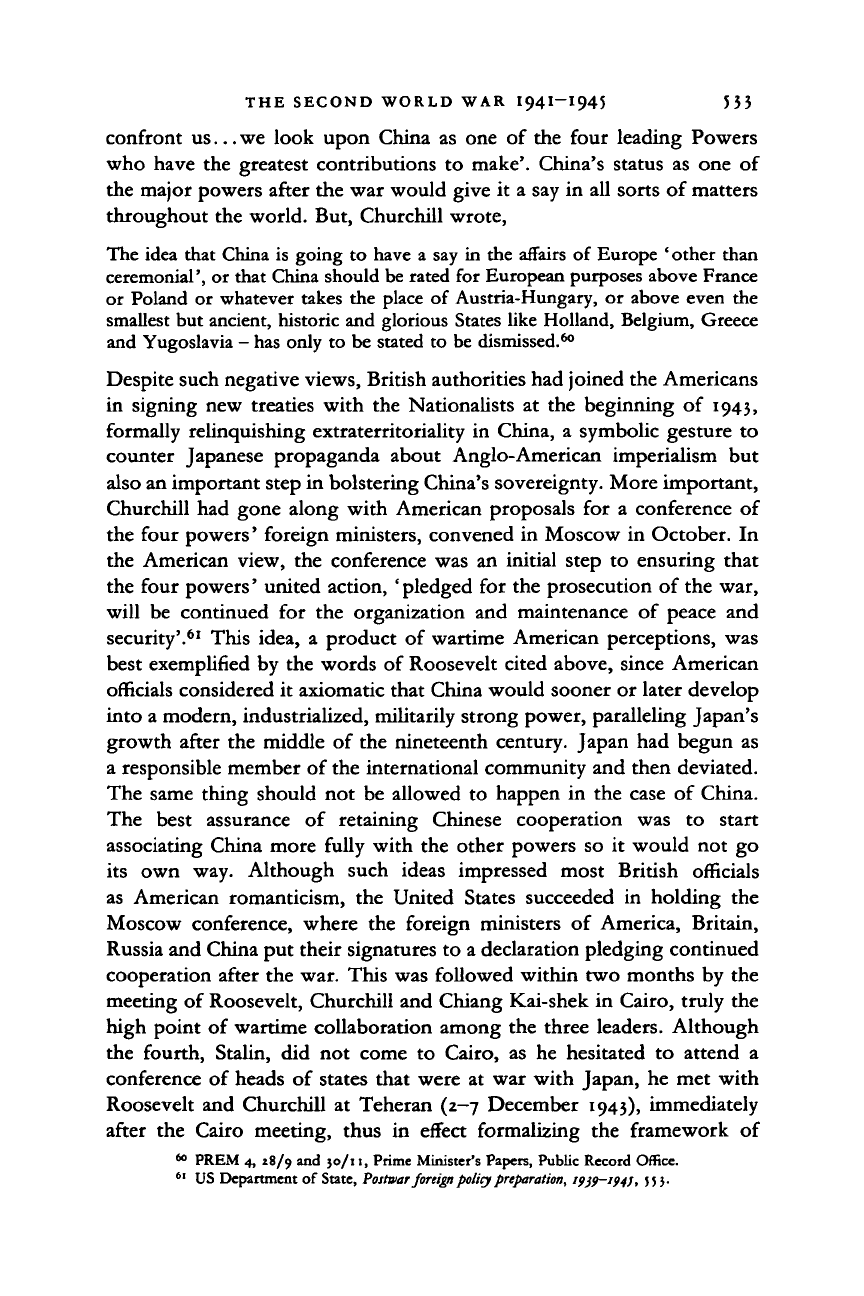
THE SECOND WORLD WAR I94I-I945
5
33
confront us... we look upon China as one of the four leading Powers
who have the greatest contributions to make'. China's status as one of
the major powers after the war would give it a say in all sorts of matters
throughout the world. But, Churchill wrote,
The idea that China is going to have a say in the affairs of Europe ' other than
ceremonial', or that China should be rated for European purposes above France
or Poland or whatever takes the place of Austria-Hungary, or above even the
smallest but ancient, historic and glorious States like Holland, Belgium, Greece
and Yugoslavia - has only to be stated to be dismissed.
60
Despite such negative views, British authorities had joined the Americans
in signing new treaties with the Nationalists at the beginning of 1943,
formally relinquishing extraterritoriality in China, a symbolic gesture to
counter Japanese propaganda about Anglo-American imperialism but
also an important step in bolstering China's sovereignty. More important,
Churchill had gone along with American proposals for a conference of
the four powers' foreign ministers, convened in Moscow in October. In
the American view, the conference was an initial step to ensuring that
the four powers' united action, ' pledged for the prosecution of the war,
will be continued for the organization and maintenance of peace and
security'.
61
This idea, a product of wartime American perceptions, was
best exemplified by the words of Roosevelt cited above, since American
officials considered it axiomatic that China would sooner or later develop
into a modern, industrialized, militarily strong power, paralleling Japan's
growth after the middle of the nineteenth century. Japan had begun as
a responsible member of the international community and then deviated.
The same thing should not be allowed to happen in the case of China.
The best assurance of retaining Chinese cooperation was to start
associating China more fully with the other powers so it would not go
its own way. Although such ideas impressed most British officials
as American romanticism, the United States succeeded in holding the
Moscow conference, where the foreign ministers of America, Britain,
Russia and China put their signatures to a declaration pledging continued
cooperation after the war. This was followed within two months by the
meeting of Roosevelt, Churchill and Chiang Kai-shek in Cairo, truly the
high point of wartime collaboration among the three leaders. Although
the fourth, Stalin, did not come to Cairo, as he hesitated to attend a
conference of heads of states that were at war with Japan, he met with
Roosevelt and Churchill at Teheran (2-7 December 1943), immediately
after the Cairo meeting, thus in effect formalizing the framework of
60
PREM
4,
28/9 and
30/11,
Prime Minister's Papers, Public Record Office.
61
US
Department
of
State, Postwar foreign policy preparation, 1939-194},
}}}•
Cambridge Histories Online © Cambridge University Press, 2008
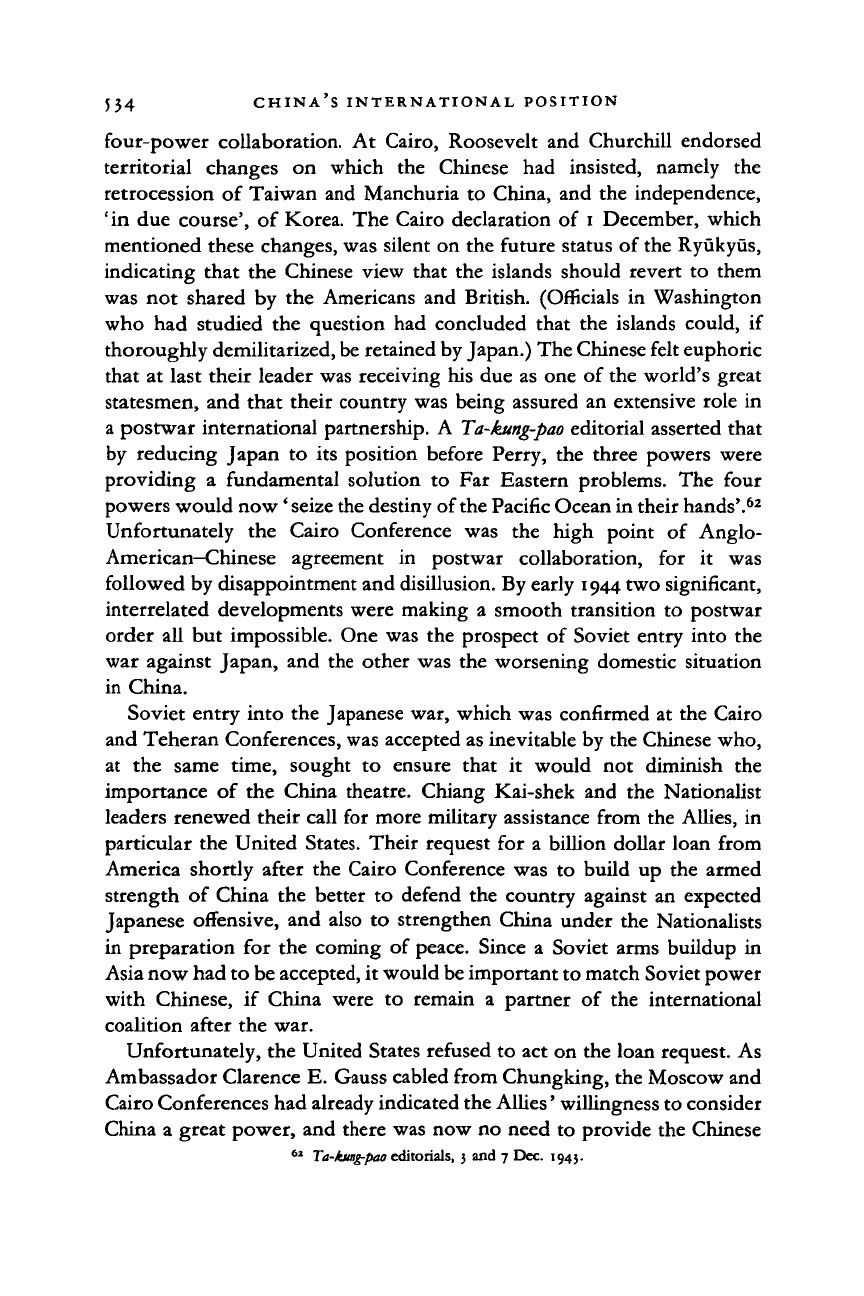
534 CHINA'S INTERNATIONAL POSITION
four-power collaboration. At Cairo, Roosevelt and Churchill endorsed
territorial changes on which the Chinese had insisted, namely the
retrocession of Taiwan and Manchuria to China, and the independence,
'in due course', of Korea. The Cairo declaration of i December, which
mentioned these changes, was silent on the future status of the Ryukyus,
indicating that the Chinese view that the islands should revert to them
was not shared by the Americans and British. (Officials in Washington
who had studied the question had concluded that the islands could, if
thoroughly demilitarized, be retained by Japan.) The Chinese felt euphoric
that at last their leader was receiving his due as one of the world's great
statesmen, and that their country was being assured an extensive role in
a postwar international partnership. A
Ta-kung-pao
editorial asserted that
by reducing Japan to its position before Perry, the three powers were
providing a fundamental solution to Far Eastern problems. The four
powers would now' seize the destiny of the Pacific Ocean in their hands'.
62
Unfortunately the Cairo Conference was the high point of Anglo-
American-Chinese agreement in postwar collaboration, for it was
followed by disappointment and disillusion. By early 1944 two significant,
interrelated developments were making a smooth transition to postwar
order all but impossible. One was the prospect of Soviet entry into the
war against Japan, and the other was the worsening domestic situation
in China.
Soviet entry into the Japanese war, which was confirmed at the Cairo
and Teheran Conferences, was accepted as inevitable by the Chinese who,
at the same time, sought to ensure that it would not diminish the
importance of the China theatre. Chiang Kai-shek and the Nationalist
leaders renewed their call for more military assistance from the Allies, in
particular the United States. Their request for a billion dollar loan from
America shortly after the Cairo Conference was to build up the armed
strength of China the better to defend the country against an expected
Japanese offensive, and also to strengthen China under the Nationalists
in preparation for the coming of peace. Since a Soviet arms buildup in
Asia now had to be accepted, it would be important to match Soviet power
with Chinese, if China were to remain a partner of the international
coalition after the war.
Unfortunately, the United States refused to act on the loan request. As
Ambassador Clarence E. Gauss cabled from Chungking, the Moscow and
Cairo Conferences had already indicated the Allies' willingness to consider
China a great power, and there was now no need to provide the Chinese
62
Ta-hmg-pao editorials, 3 and 7 Dec. 1943.
Cambridge Histories Online © Cambridge University Press, 2008
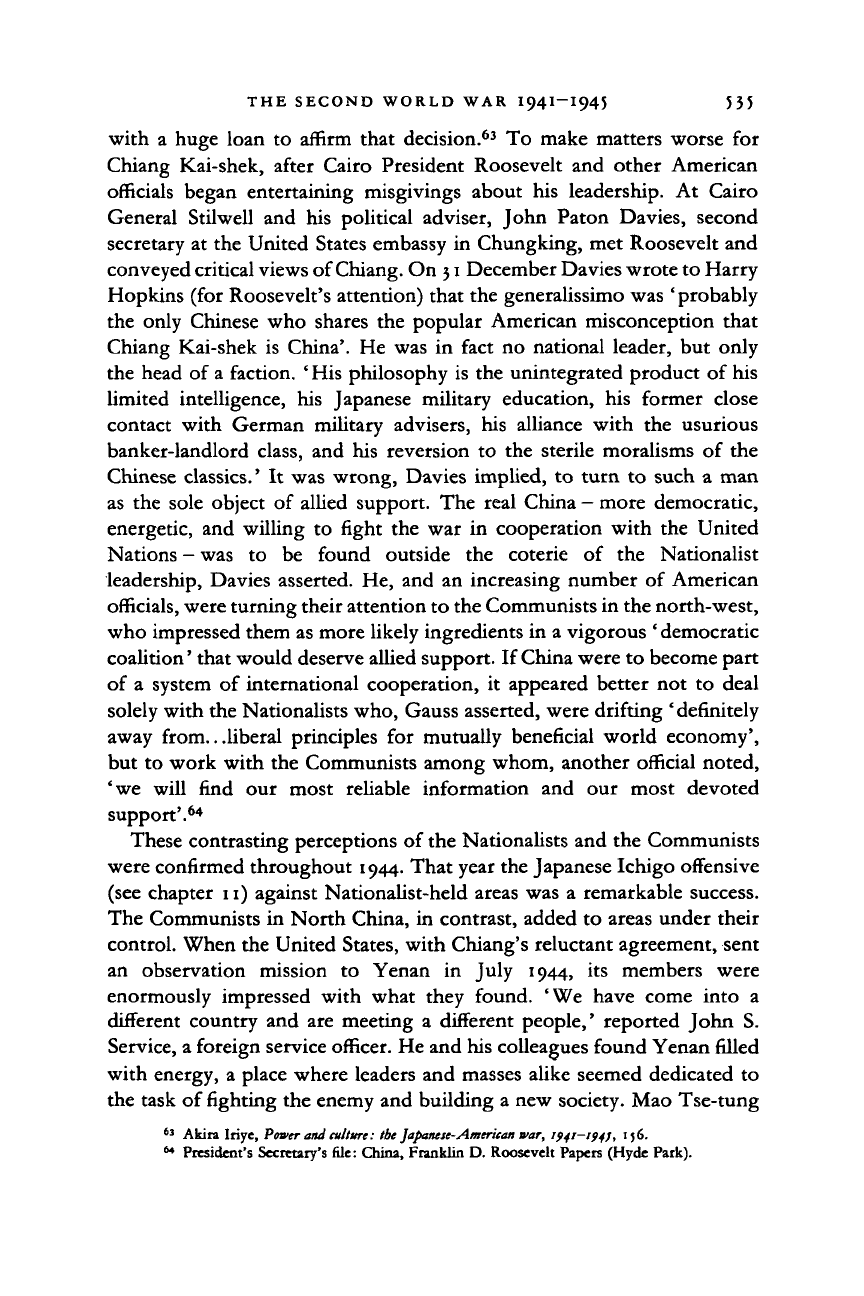
THE SECOND WORLD WAR I94I-I945 535
with a huge loan to affirm that decision.
63
To make matters worse for
Chiang Kai-shek, after Cairo President Roosevelt and other American
officials began entertaining misgivings about his leadership. At Cairo
General Stilwell and his political adviser, John Paton Davies, second
secretary at the United States embassy in Chungking, met Roosevelt and
conveyed critical views of Chiang. On
31
December Davies wrote to Harry
Hopkins (for Roosevelt's attention) that the generalissimo was ' probably
the only Chinese who shares the popular American misconception that
Chiang Kai-shek is China'. He was in fact no national leader, but only
the head of a faction. '
His
philosophy is the unintegrated product of his
limited intelligence, his Japanese military education, his former close
contact with German military advisers, his alliance with the usurious
banker-landlord class, and his reversion to the sterile moralisms of the
Chinese classics.' It was wrong, Davies implied, to turn to such a man
as the sole object of allied support. The real China - more democratic,
energetic, and willing to fight the war in cooperation with the United
Nations - was to be found outside the coterie of the Nationalist
leadership, Davies asserted. He, and an increasing number of American
officials, were turning their attention to the Communists in the north-west,
who impressed them as more likely ingredients in a vigorous ' democratic
coalition' that would deserve allied support. If China were to become part
of a system of international cooperation, it appeared better not to deal
solely with the Nationalists who, Gauss asserted, were drifting ' definitely
away from.. .liberal principles for mutually beneficial world economy',
but to work with the Communists among whom, another official noted,
'we will find our most reliable information and our most devoted
support'.
64
These contrasting perceptions of the Nationalists and the Communists
were confirmed throughout 1944. That year the Japanese Ichigo offensive
(see chapter 11) against Nationalist-held areas was a remarkable success.
The Communists in North China, in contrast, added to areas under their
control. When the United States, with Chiang's reluctant agreement, sent
an observation mission to Yenan in July 1944, its members were
enormously impressed with what they found. 'We have come into a
different country and are meeting a different people,' reported John S.
Service, a foreign service officer. He and his colleagues found Yenan filled
with energy, a place where leaders and masses alike seemed dedicated to
the task of fighting the enemy and building a new society. Mao Tse-tung
63
Akira Iriye, Power and culture: the Japanese-American war, 1)41-if
4),
156.
64
President's Secretary's file: China, Franklin
D.
Roosevelt Papers (Hyde Park).
Cambridge Histories Online © Cambridge University Press, 2008
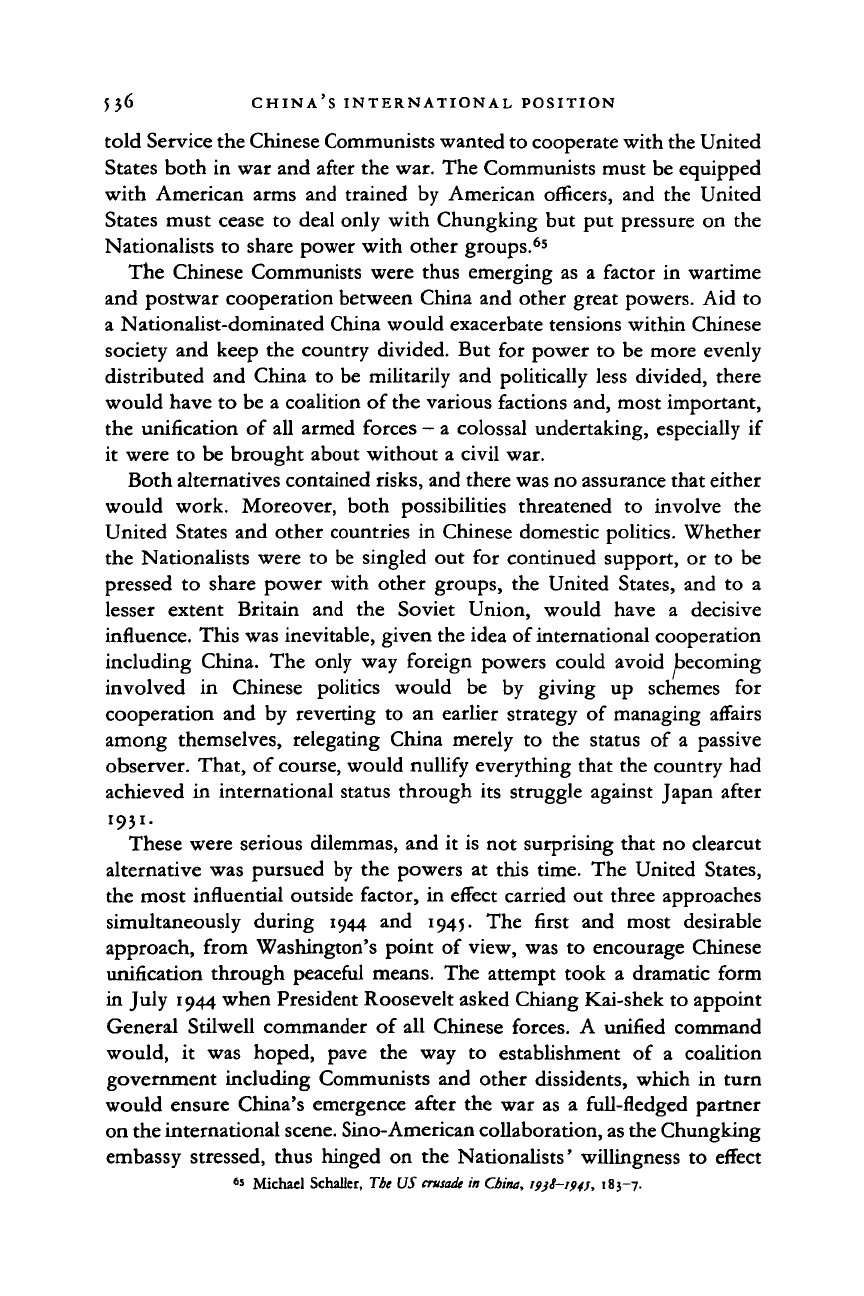
536 CHINA'S INTERNATIONAL POSITION
told Service the Chinese Communists wanted to cooperate with the United
States both
in war and
after
the
war. The Communists must
be
equipped
with American arms
and
trained
by
American officers,
and the
United
States must cease
to
deal only with Chungking
but put
pressure
on the
Nationalists
to
share power with other groups.
65
The Chinese Communists were thus emerging
as a
factor
in
wartime
and postwar cooperation between China
and
other great powers.
Aid to
a Nationalist-dominated China would exacerbate tensions within Chinese
society
and
keep
the
country divided.
But for
power
to be
more evenly
distributed
and
China
to be
militarily
and
politically less divided, there
would have
to be a
coalition
of
the various factions and, most important,
the unification
of
all armed forces
- a
colossal undertaking, especially
if
it were
to be
brought about without
a
civil
war.
Both alternatives contained risks, and there was no assurance that either
would work. Moreover, both possibilities threatened
to
involve
the
United States
and
other countries
in
Chinese domestic politics. Whether
the Nationalists were
to be
singled
out for
continued support,
or to be
pressed
to
share power with other groups,
the
United States,
and to a
lesser extent Britain
and the
Soviet Union, would have
a
decisive
influence. This was inevitable, given the idea
of
international cooperation
including China.
The
only
way
foreign powers could avoid becoming
involved
in
Chinese politics would
be by
giving
up
schemes
for
cooperation
and by
reverting
to an
earlier strategy
of
managing affairs
among themselves, relegating China merely
to the
status
of a
passive
observer. That,
of
course, would nullify everything that
the
country
had
achieved
in
international status through
its
struggle against Japan after
1931.
These were serious dilemmas,
and it is not
surprising that
no
clearcut
alternative
was
pursued
by the
powers
at
this time.
The
United States,
the most influential outside factor,
in
effect carried
out
three approaches
simultaneously during
1944 and 1945. The
first
and
most desirable
approach, from Washington's point
of
view,
was to
encourage Chinese
unification through peaceful means.
The
attempt took
a
dramatic form
in July 1944 when President Roosevelt asked Chiang Kai-shek
to
appoint
General Stilwell commander
of all
Chinese forces.
A
unified command
would,
it was
hoped, pave
the way to
establishment
of a
coalition
government including Communists
and
other dissidents, which
in
turn
would ensure China's emergence after
the war as a
full-fledged partner
on the international scene. Sino-American collaboration, as the Chungking
embassy stressed, thus hinged
on the
Nationalists' willingness
to
effect
6s
Michael Schaller, The US
crusade
in
China,
rfjg-tfjj, 183-7.
Cambridge Histories Online © Cambridge University Press, 2008
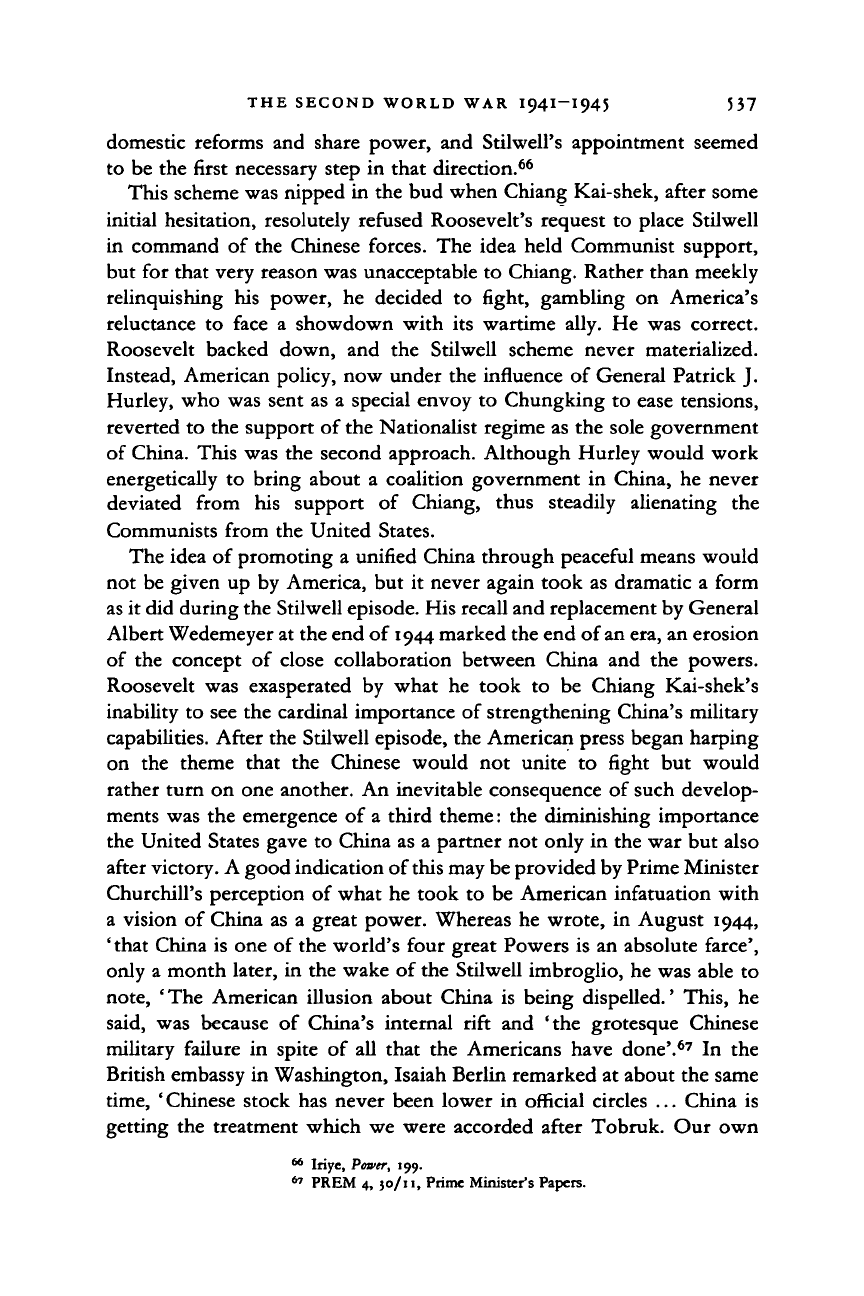
THE SECOND WORLD WAR I941-I945 537
domestic reforms
and
share power,
and
StilwelFs appointment seemed
to
be the
first necessary step
in
that direction.
66
This scheme was nipped
in the bud
when Chiang Kai-shek, after some
initial hesitation, resolutely refused Roosevelt's request
to
place Stilwell
in command
of the
Chinese forces.
The
idea held Communist support,
but
for
that very reason was unacceptable
to
Chiang. Rather than meekly
relinquishing
his
power,
he
decided
to
fight, gambling
on
America's
reluctance
to
face
a
showdown with
its
wartime ally.
He was
correct.
Roosevelt backed down,
and the
Stilwell scheme never materialized.
Instead, American policy,
now
under
the
influence
of
General Patrick
J.
Hurley,
who
was sent
as a
special envoy
to
Chungking
to
ease tensions,
reverted
to the
support
of
the Nationalist regime
as the
sole government
of China. This was
the
second approach. Although Hurley would work
energetically
to
bring about
a
coalition government
in
China,
he
never
deviated from
his
support
of
Chiang, thus steadily alienating
the
Communists from
the
United States.
The idea
of
promoting
a
unified China through peaceful means would
not
be
given
up by
America,
but it
never again took
as
dramatic
a
form
as
it
did during the Stilwell episode. His recall and replacement by General
Albert Wedemeyer at the end
of
1944 marked the end of an era, an erosion
of
the
concept
of
close collaboration between China
and the
powers.
Roosevelt
was
exasperated
by
what
he
took
to be
Chiang Kai-shek's
inability
to
see
the
cardinal importance
of
strengthening China's military
capabilities. After the Stilwell episode, the American press began harping
on
the
theme that
the
Chinese would
not
unite
to
fight
but
would
rather turn
on one
another.
An
inevitable consequence
of
such develop-
ments was
the
emergence
of a
third theme:
the
diminishing importance
the United States gave
to
China
as a
partner
not
only
in the war but
also
after victory. A good indication of this may be provided by Prime Minister
Churchill's perception
of
what
he
took
to be
American infatuation with
a vision
of
China
as a
great power. Whereas
he
wrote,
in
August
1944,
'that China
is one of
the world's four great Powers
is an
absolute farce',
only
a
month later,
in the
wake
of
the Stilwell imbroglio,
he
was able
to
note,
'The
American illusion about China
is
being dispelled.' This,
he
said,
was
because
of
China's internal rift
and 'the
grotesque Chinese
military failure
in
spite
of all
that
the
Americans have done'.
67
In the
British embassy
in
Washington, Isaiah Berlin remarked
at
about the same
time,
'
Chinese stock
has
never been lower
in
official circles
...
China
is
getting
the
treatment which
we
were accorded after Tobruk.
Our own
66
Iriyc, Power,
199.
67
PREM
4,
30/11, Prime Minister's Papers.
Cambridge Histories Online © Cambridge University Press, 2008

53$ CHINA'S INTERNATIONAL POSITION
position
is
enhanced
by
contrast'.
68
The war
cabinet
in
London agreed,
noting that 'partly as
a
result of the friction between China and the United
States,
the
British position [has] been improved'.
60
In
the
winter
of
1944-5
the
United States solidified
its
ties with both
Britain and Russia
to
such an extent that the vaunted big-four cooperation
was being reduced
to
big-three collaboration. The meeting
of
Roosevelt,
Churchill
and
Stalin
at
Yalta
in
February 1945,
as the
Chinese correctly
judged then and since, put an end to the concept of China's full partnership
in world affairs.
At
Yalta Stalin once again promised
to
enter
the war
against Japan approximately three months after Germany's defeat; he also
reiterated his terms,
and
the three leaders agreed that after the war Russia
would regain south Sakhalin
and the
Kurile Islands, lease
the
naval base
of Port Arthur, establish
a
predominant position
in
Dairen, which
was
to
be
internationalized,
and
retain preponderant interests
in the
railways
in Manchuria over which
a
joint Chinese-Russian agency would
be
established. These concessions, made without consulting
the
Chinese,
formalized
the
impending establishment
of a
powerful Soviet sphere
of
power
in
north-eastern Asia,
and a
corresponding decline
of
China's
position.
Both•
Churchill
and
Roosevelt
saw the
situation
in
this light;
the Soviet Union would gain
a
position
of
influence
in
Asia just
as it
did
in
Europe,
and
these spheres, together with British
and
American
spheres
of
their own, would define
the
postwar global status quo. Gone
was
the
vision
of
postwar cooperation among four powers, including
China. Instead, America, Russia
and
Britain
-
and increasingly
it was
becoming evident that
the
first
two
would
set
themselves apart
as a
pair
of super-powers
-
would serve as the definers and guarantors of the world
after the peace. Where such
an
arrangement
put
China was
not
clear.
The
Yalta conferees accepted
the
Nationalist regime
as the
legitimate
government
of
China. Stalin agreed with Roosevelt that Chiang Kai-shek
should remain
the
dominant figure
in
Chinese politics.
70
Russia's interest
was to
deal with Chiang
and
have
him
recognize
the
Yalta concessions
on
Manchuria. Stalin could
not, of
course, ignore
the
Chinese Communists,
but
apparently
he did not
believe they would soon
emerge
as
plausible contenders
for
power.
Nor was he
insistent
on
forming
a
coalition government
in
China. His primary concern was with
seizing strategic areas
in
north-eastern Asia, and he judged that this could
best
be
achieved through
an
arrangement with
the
United States.
He
promised Roosevelt that
the
Soviet Union would negotiate with
the
68
Isaiah Berlin, Washington despatches, 1/41-/94;, 448.
69
FE
(44), CAB 96/5, Cabinet Papers, Public Record Office.
?° Schaller, 211.
Cambridge Histories Online © Cambridge University Press, 2008
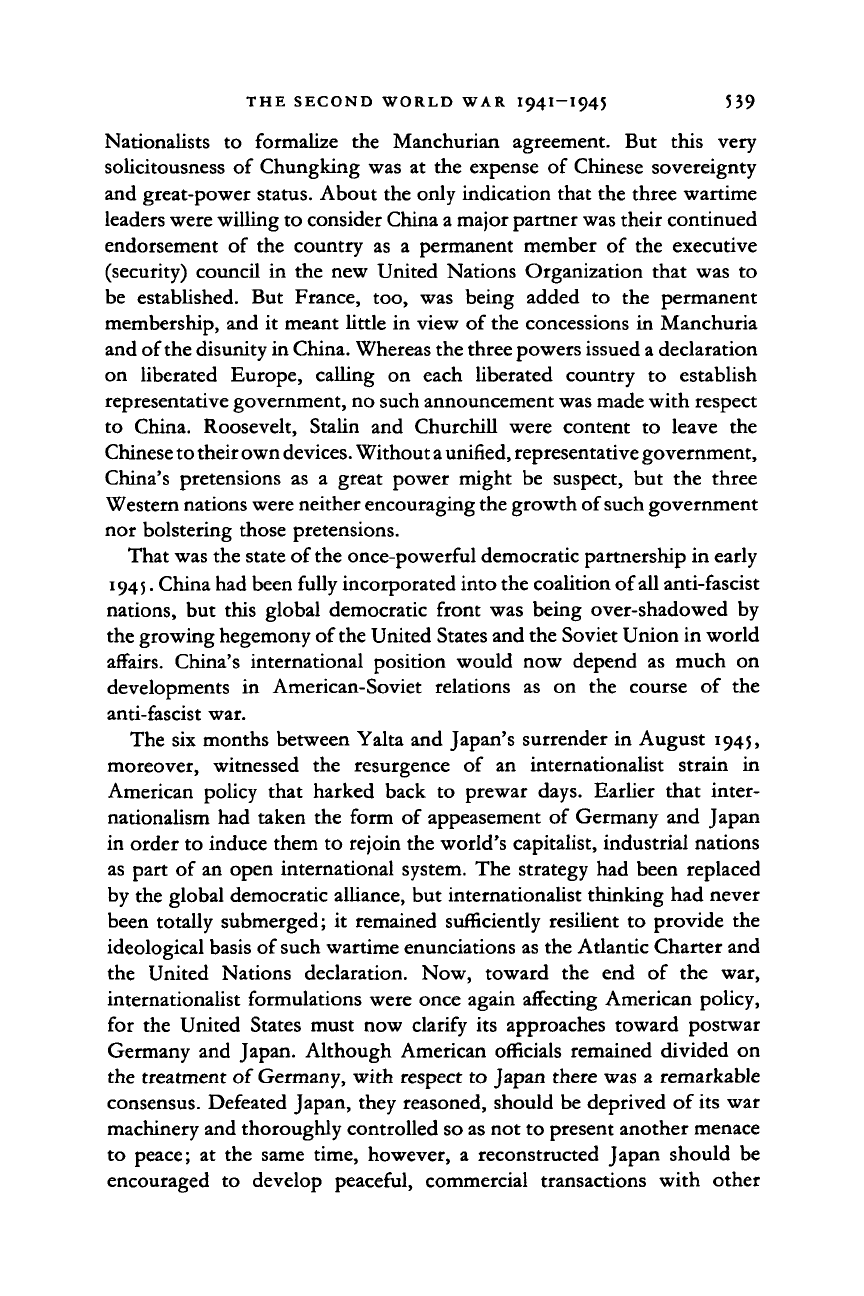
THE SECOND WORLD WAR I94I-I945
5
39
Nationalists to formalize the Manchurian agreement. But this very
solicitousness of Chungking was at the expense of Chinese sovereignty
and great-power status. About the only indication that the three wartime
leaders were willing to consider China a major partner was their continued
endorsement of the country as a permanent member of the executive
(security) council in the new United Nations Organization that was to
be established. But France, too, was being added to the permanent
membership, and it meant little in view of the concessions in Manchuria
and of the disunity in China. Whereas the three powers issued a declaration
on liberated Europe, calling on each liberated country to establish
representative government, no such announcement was made with respect
to China. Roosevelt, Stalin and Churchill were content to leave the
Chinese to their own
devices.
Without a unified, representative government,
China's pretensions as a great power might be suspect, but the three
Western nations were neither encouraging the growth of such government
nor bolstering those pretensions.
That was the state of the once-powerful democratic partnership in early
1945.
China had been fully incorporated into the coalition of all anti-fascist
nations, but this global democratic front was being over-shadowed by
the growing hegemony of the United States and the Soviet Union in world
affairs. China's international position would now depend as much on
developments in American-Soviet relations as on the course of the
anti-fascist war.
The six months between Yalta and Japan's surrender in August 1945,
moreover, witnessed the resurgence of an internationalist strain in
American policy that harked back to prewar days. Earlier that inter-
nationalism had taken the form of appeasement of Germany and Japan
in order to induce them to rejoin the world's capitalist, industrial nations
as part of an open international system. The strategy had been replaced
by the global democratic alliance, but internationalist thinking had never
been totally submerged; it remained sufficiently resilient to provide the
ideological basis of such wartime enunciations as the Atlantic Charter and
the United Nations declaration. Now, toward the end of the war,
internationalist formulations were once again affecting American policy,
for the United States must now clarify its approaches toward postwar
Germany and Japan. Although American officials remained divided on
the treatment of Germany, with respect to Japan there was a remarkable
consensus. Defeated Japan, they reasoned, should be deprived of its war
machinery and thoroughly controlled so as not to present another menace
to peace; at the same time, however, a reconstructed Japan should be
encouraged to develop peaceful, commercial transactions with other
Cambridge Histories Online © Cambridge University Press, 2008
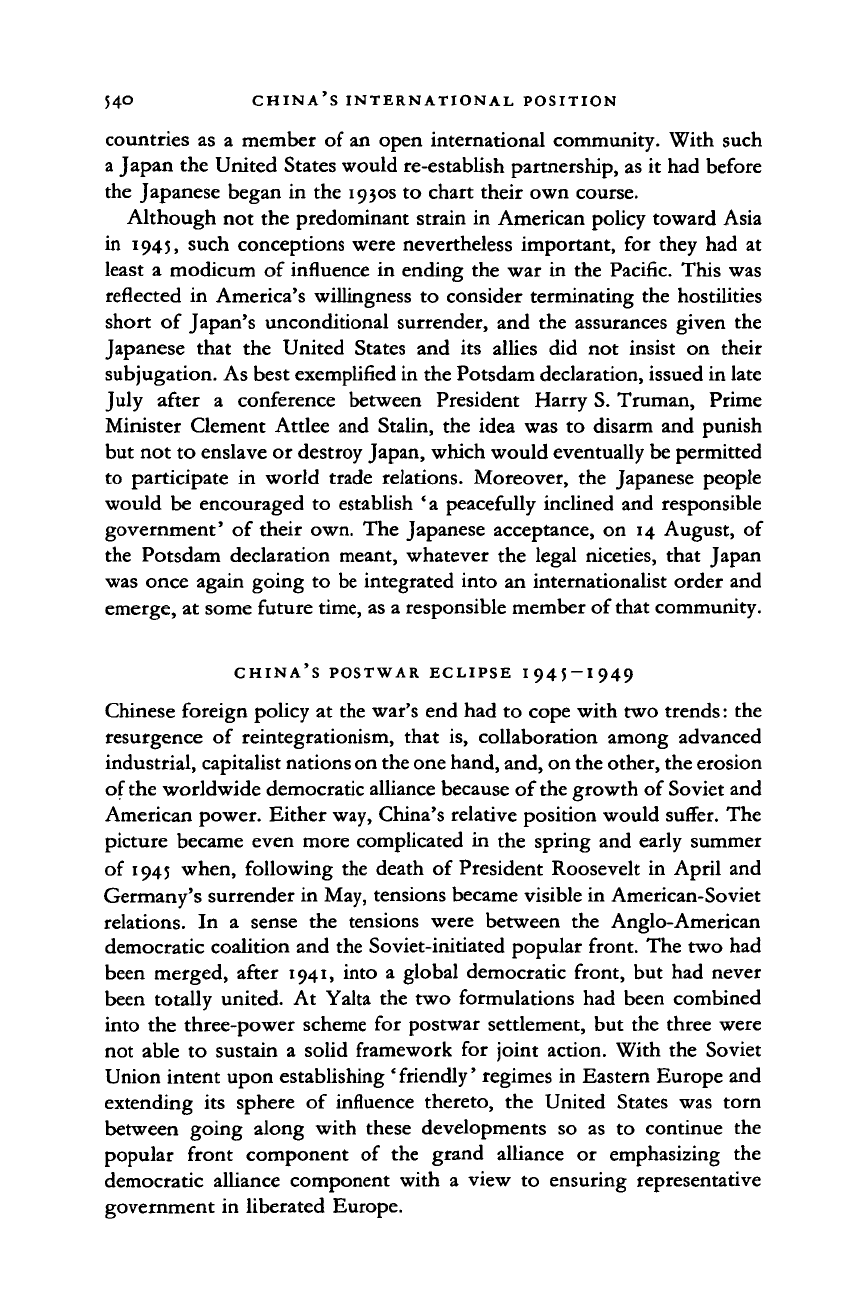
54° CHINA S INTERNATIONAL POSITION
countries as a member of an open international community. With such
a Japan the United States would re-establish partnership, as it had before
the Japanese began in the 1930s to chart their own course.
Although not the predominant strain in American policy toward Asia
in 1945, such conceptions were nevertheless important, for they had at
least a modicum of influence in ending the war in the Pacific. This was
reflected in America's willingness to consider terminating the hostilities
short of Japan's unconditional surrender, and the assurances given the
Japanese that the United States and its allies did not insist on their
subjugation. As best exemplified in the Potsdam declaration, issued in late
July after a conference between President Harry S. Truman, Prime
Minister Clement Attlee and Stalin, the idea was to disarm and punish
but not to enslave or destroy Japan, which would eventually be permitted
to participate in world trade relations. Moreover, the Japanese people
would be encouraged to establish 'a peacefully inclined and responsible
government' of their own. The Japanese acceptance, on 14 August, of
the Potsdam declaration meant, whatever the legal niceties, that Japan
was once again going to be integrated into an internationalist order and
emerge, at some future time, as a responsible member of that community.
CHINA'S POSTWAR ECLIPSE 1945-1949
Chinese foreign policy at the war's end had to cope with two trends: the
resurgence of reintegrationism, that is, collaboration among advanced
industrial, capitalist nations on the one hand, and, on the other, the erosion
of the worldwide democratic alliance because of the growth of Soviet and
American power. Either way, China's relative position would suffer. The
picture became even more complicated in the spring and early summer
of 1945 when, following the death of President Roosevelt in April and
Germany's surrender in May, tensions became visible in American-Soviet
relations. In a sense the tensions were between the Anglo-American
democratic coalition and the Soviet-initiated popular front. The two had
been merged, after 1941, into a global democratic front, but had never
been totally united. At Yalta the two formulations had been combined
into the three-power scheme for postwar settlement, but the three were
not able to sustain a solid framework for joint action. With the Soviet
Union intent upon establishing ' friendly' regimes in Eastern Europe and
extending its sphere of influence thereto, the United States was torn
between going along with these developments so as to continue the
popular front component of the grand alliance or emphasizing the
democratic alliance component with a view to ensuring representative
government in liberated Europe.
Cambridge Histories Online © Cambridge University Press, 2008
